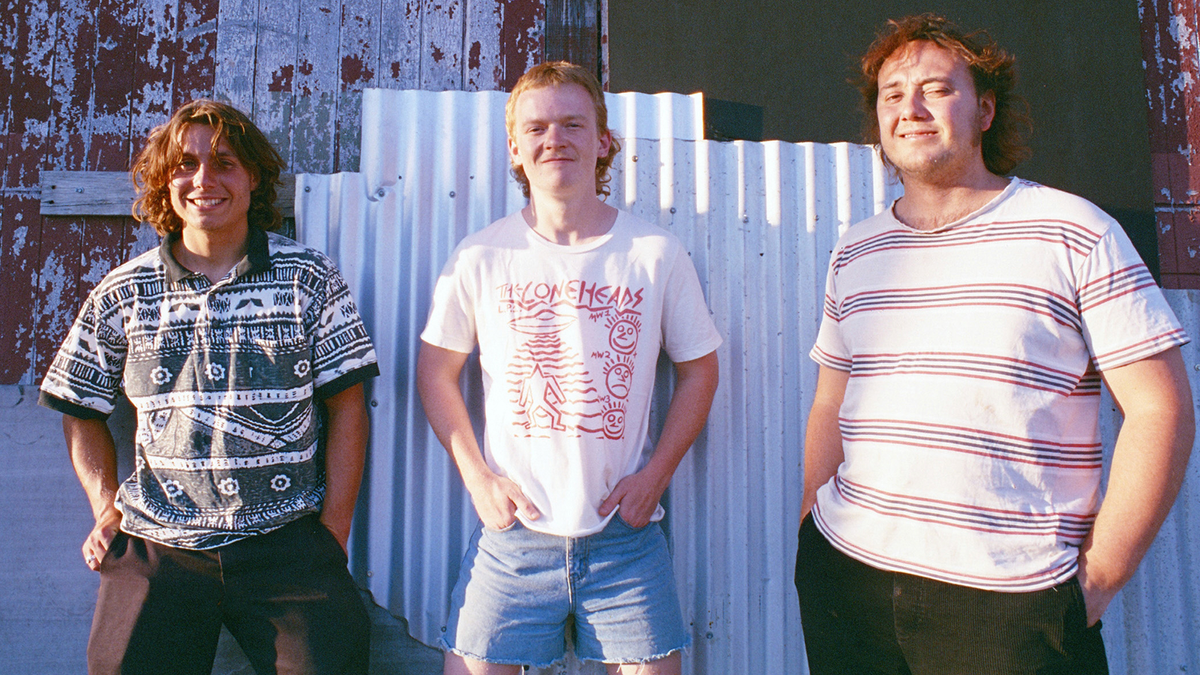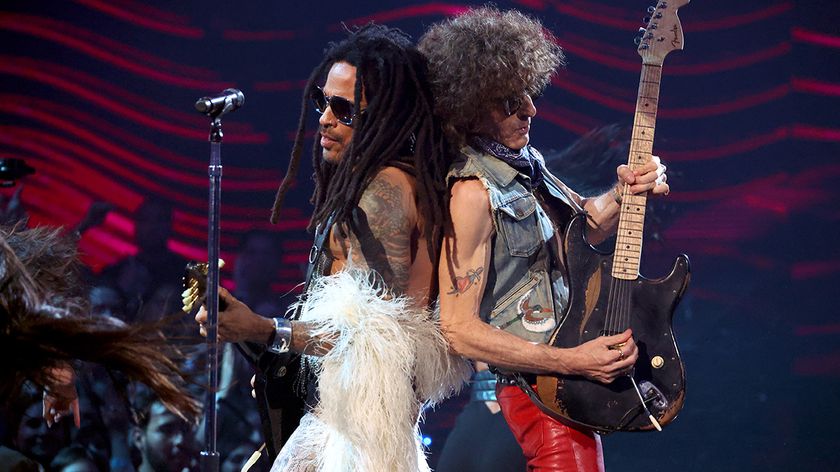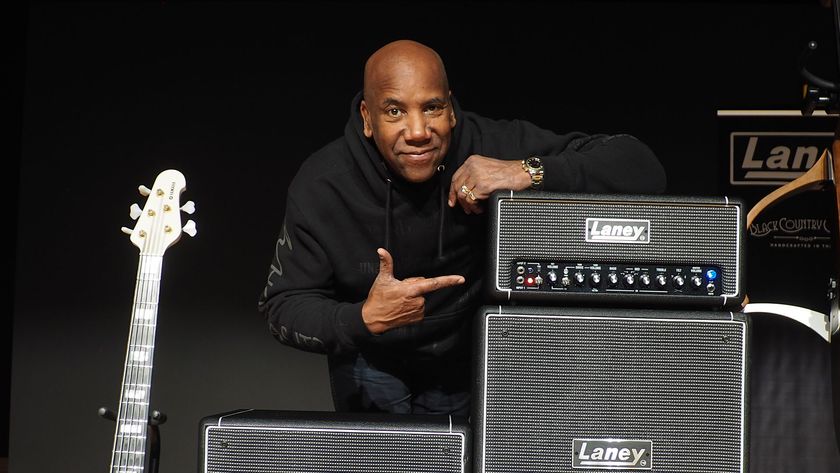The Chats: “We’re sounding better than ever right now, and I’m f***ing stoked with that”
Australian Guitar dives headfirst into the mosh-ready madness of The Chats’ balls-to-the-wall second album, ‘Get F***ed’

Of all the timeless sayings in the Australian language, one is distinct for a multitude of reasons: “Get f***ed.” It can be utilised to reflect excitement (“50 percent off Shapes at Woolies!? Get f***ed!”), bewilderment (“Get f***ed, that kangaroo just crushed an entire keg of VB with its biceps”), disappointment (“Get f***ed, as if I’m paying $2.10 a litre for E-10”), anger (“Look at this dickhead doing 60 in an 80 zone, get f***ed”) and even love (“You bought me this? Get f***ed, that’s so sweet”).
But perhaps its most apt utility is in expressing astonishment – every once in a blue moon, for example, you’ll hear an album so inconceivably wild, so off-chops and intense that the only words your mind can conjure in reaction are, of course, “Get f***ed.” The Chats’ second full-length effort – titled, you guessed it, Get F***ed – is one of those albums.
Get F***ed is about as unhinged as its title and cover art – a monochrome snap of The Chats, clad in shirts sporting beer brand logos, passionately flipping off their cameraman – imply. It’s a blistering, breakneck-paced ripper of an album, where only two of its 13 songs break three minutes, and absolutely none of them give the listener a chance to catch a breath. Part of that comes down to the inclusion of newcoming guitarist Josh Hardy, who replaced Josh “Pricey” Price a few months after The Chats released their debut album, High Risk Behaviour, in March of 2020.
That was, to say the least, a whirlwind time – for everybody. The COVID-19 pandemic had just taken hold, and the entire planet was thrust into a state of anxiety, uncertainty and general tumult. The Chats, too, had just released their first full-length effort, three years after their mainstream eruption, with all eyes set firmly on the Sunny Coast trio. Taking the reins as the most important member in The Chats at the most pivotal moment on their timeline (thus far, at least), Hardy – who also fronts The Unknowns – was flung into a position that sounds enticing as it does absolutely terrifying. But as he tells Australian Guitar, it wasn’t actually that big of a deal.
What was that experience like for you, joining The Chats in such a chaotic time for everyone involved?
Well musically, it was really easy because we all grew up with each other, and I was already real good mates with Eamon and Matt – and with Pricey, too, to an extent. But obviously, joining an already established band that was very popular, people outside it all had different opinions of me. I copped a lot of flak for it at first, but it was good – I just had to prove myself to all the real diehard fans. And everyone’s been saying that we’re sounding better than ever right now, so I’m f***ing stoked with that.
You have a bit of a rockabilly background, don’t you? Eamon said you used to slick your hair back and everything.
Yeah, back in the day! I’ve always been a big fan of garage-rock, psych-rock, rockabilly – all that stuff. I loved The Cramps when I was growing up – you know, all those sort of bands that came from that scene in the ‘70s. They’re classics. My other band, The Unknowns, we started off as sort of like a psych-y, rockabilly-garage trio. That was my shtick, I guess, when I was 16.
That really shines through on a song like ‘Getting Better’, with that real surfy, ‘50s rock ’n’ roll kind of vibe.
Oh yeah, for sure. That was one of the first songs that I brought to The Chats – I wrote it for myself but I was like, “Ah, this could be good for The Chats!” And if they didn’t want to use it, I would have used it for The Unknowns – but [The Chats] really liked the sound of it, so we just went all-in. It’s a bit different to the other stuff [on Get F***ed], which I was stoked with.
Get The Pick Newsletter
All the latest guitar news, interviews, lessons, reviews, deals and more, direct to your inbox!
Your solos on this record are mental, too – was that something you focussed a lot of energy into?
I try not to think about it too much. I feel like playing lead guitar – especially in my position with the band, where it’s a three-piece and everything’s very straightforward – if you start to overthink things, it becomes easy to overcompensate. So I just tried to go in there and do what I do best – maybe smoke a joint or something beforehand, then just get in there, stand right in front of the amp and play whatever’s in my head. Because every single time I play a guitar solo – even in the older stuff, when we’re playing those songs live – I never play the same thing twice.
Were you doing much improv in the studio?
Yeah, completely. The whole album.
Just to capture that raw, live energy?
Yeah, exactly. I feel like that’s the best sort of rock ’n’ roll there is, you know? It’s all about the spontaneity – it’s not always bang-on, but when you manage to get something solid down, it’s f***ing perfect. So all the solos that you hear on the record are the ones that I felt really worked. I did each one a few times, and we just sort of picked the one that we all thought represented the song the best at that moment in time.
Was there a concerted effort to build on the sound of High Risk Behaviour?
Yeah, I think sonically it’s changed a bit because we’re a lot louder now. I’m a bit of a gear nerd – I love playing JCM800s, which are very loud, and [the songwriting is] probably just a little bit more sonically charged. And I feel like for a lot of punk fans – to fans of The Chats and people that know the music – they’ll agree it’s a pretty natural progression. I feel like it was a good direction to go in, you know, to have a bit more power. The early stuff had a bit more of a lo-fi, softer sort of sound, and then High Risk Behaviour was kind of like halfway there, and now Get F***ed is just completely in-your-face.
With a title as bold as Get F***ed, you need music that sounds fittingly intense.
Exactly! And that was it, I think that’s how we all decided that would be a really good title. Because the title came after we’d recorded pretty much the whole thing. We probably all thought subconsciously that it was the most fitting title for it, considering how it sounded.
Let’s chat gear: what guitars were you tearing shit up on for this record?
I tracked the whole thing with a Gibson SG. It had two P-90 pickups, but I only used the bridge pickup. That was used for all the rhythm guitars, and then for the lead stuff, I used my 1965 Epiphone Olympia – it’s one of the ones with the Batman headstock and two single-coils. And then with the lead stuff, I just used a[n Ibanez] TS808 tubescreamer and the wah.
Simple, but effective.
That’s it! Especially with the lead parts, I just like to have that control over everything. And feedback-wise as well, I like that sound you get as soon as you hit the tubescreamer – it’s like a kettle boiling, you know? And then the wah sort of helped to cut through everything a bit. I really like that Stooges sort of wah sound, you know?

Ellie Robinson is an Australian writer, editor and dog enthusiast with a keen ear for pop-rock and a keen tongue for actual Pop Rocks. Her bylines include music rag staples like NME, BLUNT, Mixdown and, of course, Australian Guitar (where she also serves as Editor-at-Large), but also less expected fare like TV Soap and Snowboarding Australia. Her go-to guitar is a Fender Player Tele, which, controversially, she only picked up after she'd joined the team at Australian Guitar. Before then, Ellie was a keyboardist – thankfully, the AG crew helped her see the light…

“Walk Like an Egyptian was so silly. But solid players have asked, ‘What are you playing at the end?’”: Vicki Peterson sees herself as “a bit of a hack player,” but she still made guitar-pop history with the Bangles – and guested with Tom Petty

“We had 15 minutes left, and it was time to go… I just started playing that riff. Then Lenny goes, ‘Whoa, what’s that?’” Lenny Kravitz guitarist Craig Ross reveals the serendipitous roots of a Kravitz classic








